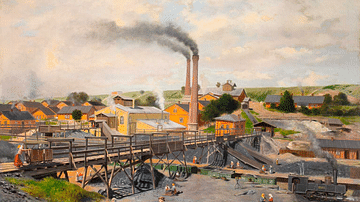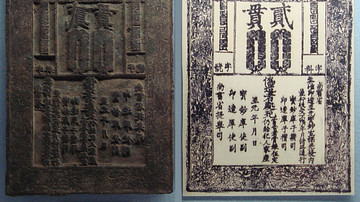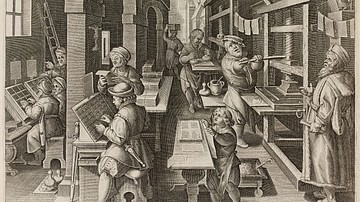Search
Remove Ads
Advertisement
Summary 
Loading AI-generated summary based on World History Encyclopedia articles ...
Search Results

Article
The Invention of the First Coinage in Ancient Lydia
Money may take many forms, from the digital code of cryptocurrency to the woodpecker scalps favoured in early California. People have also used cattle, cacao beans, cowrie shells, chewing gum, grain, and giant stones as money. Early cultures...

Video
The Ancient History of Beer: Invention, Importance and Development of Beer
In honour of International Beer Day, learn all about the ancient history of beer, when it was invented, who invented it and its long history! The English word Beer comes from the Latin 'bibere' meaning ‘to drink,’ however beer brewing did...

Definition
Johannes Gutenberg
Johannes Gutenberg (l. c. 1398-1468) was the inventor of the printing press (c. 1450) who seems to have developed the device from wine and oil presses of the time. Gutenberg’s printing press not only revolutionized book making but literally...

Definition
British Industrial Revolution
The British Industrial Revolution (1760-1840) brought innovative mechanisation and deep social change. The process saw the invention of steam-powered machines, which were used in factories in ever-growing urban centres. Agriculture remained...

Definition
Scientific Revolution
The Scientific Revolution (1500-1700), which occurred first in Europe before spreading worldwide, witnessed a new approach to knowledge gathering – the scientific method – which utilised new technologies like the telescope to observe, measure...

Article
The Impact of the British Industrial Revolution
The consequences of the British Industrial Revolution (1760-1840) were many, varied, and long-lasting. Working life in rural and urban settings was changed forever by the inventions of new machines, the spread of factories, and the decline...

Article
Paper in Ancient China
The widespread use of paper and printing were features of ancient China which distinguished it from other ancient cultures. Traditionally, paper was invented in the early 2nd century CE, but there is evidence it was much earlier. As a cheaper...

Definition
Script
Script is the written expression of a language. Cuneiform, the first script, was invented in Sumer, Mesopotamia c. 3500 BCE, hieroglyphics sometime prior to the Early Dynastic Period in Egypt (c. 3150-2613 BCE), and Sanskrit in India during...

Article
The Printing Revolution in Renaissance Europe
The arrival in Europe of the printing press with moveable metal type in the 1450s CE was an event which had enormous and long-lasting consequences. The German printer Johannes Gutenberg (c. 1398-1468 CE) is widely credited with the innovation...

Article
Mesopotamian Inventions
Mesopotamian inventions include many items taken for granted today, most of which were created during the Early Dynastic Period (2900-2334 BCE) or developed from achievements of the Uruk Period (4100-2900 BCE). The Sumerians are credited...